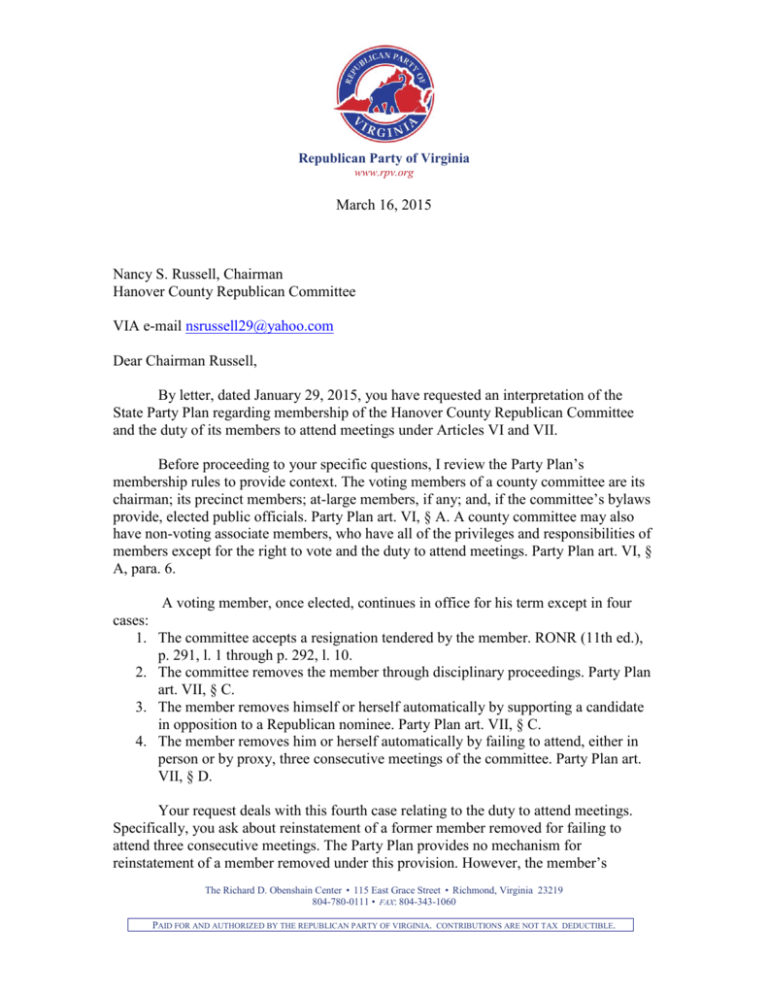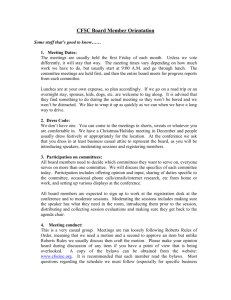Classes of Membership and Attendance Requirements
advertisement

Republican Party of Virginia www.rpv.org March 16, 2015 Nancy S. Russell, Chairman Hanover County Republican Committee VIA e-mail nsrussell29@yahoo.com Dear Chairman Russell, By letter, dated January 29, 2015, you have requested an interpretation of the State Party Plan regarding membership of the Hanover County Republican Committee and the duty of its members to attend meetings under Articles VI and VII. Before proceeding to your specific questions, I review the Party Plan’s membership rules to provide context. The voting members of a county committee are its chairman; its precinct members; at-large members, if any; and, if the committee’s bylaws provide, elected public officials. Party Plan art. VI, § A. A county committee may also have non-voting associate members, who have all of the privileges and responsibilities of members except for the right to vote and the duty to attend meetings. Party Plan art. VI, § A, para. 6. A voting member, once elected, continues in office for his term except in four cases: 1. The committee accepts a resignation tendered by the member. RONR (11th ed.), p. 291, l. 1 through p. 292, l. 10. 2. The committee removes the member through disciplinary proceedings. Party Plan art. VII, § C. 3. The member removes himself or herself automatically by supporting a candidate in opposition to a Republican nominee. Party Plan art. VII, § C. 4. The member removes him or herself automatically by failing to attend, either in person or by proxy, three consecutive meetings of the committee. Party Plan art. VII, § D. Your request deals with this fourth case relating to the duty to attend meetings. Specifically, you ask about reinstatement of a former member removed for failing to attend three consecutive meetings. The Party Plan provides no mechanism for reinstatement of a member removed under this provision. However, the member’s The Richard D. Obenshain Center • 115 East Grace Street • Richmond, Virginia 23219 804-780-0111 • FAX: 804-343-1060 PAID FOR AND AUTHORIZED BY THE REPUBLICAN PARTY OF VIRGINIA. CONTRIBUTIONS ARE NOT TAX DEDUCTIBLE. removal creates a vacancy in the committee’s membership and the committee may fill a vacancy for the remaining unexpired portion of a term. Party Plan art. VI, § C, para. 3. The vacancy may only be filled after notice has been included in the call of the meeting. Party Plan art. VI, § C, para. 4. Elections to fill a vacancy must also meet any conditions set out in the committee’s own rules, such as the requirements outlined in Article IV, Section A of the Bylaws of the Hanover Republican Committee, a copy of which you provided to me. You also inquire as to the significance of the difference in language between “automatically loses his committee position” and “automatically loses and is deemed to have resigned his Committee position,” the first of which applies to any member of an Official Committee and the second of which applies only to members of the State Central Committee. In parliamentary law, the difference is not significant; both provisions could simply be read “is no longer a member of the committee.” You also make reference to a former member removed for failing to attend meetings being considered an associate member. While the Party Plan makes no such provision for such a change in status, the election of associate members is left for the unit committee to determine in its bylaws. I see no reason that removal pursuant to of Article VII, Section D of the State Party Plan could not also constitute election to associate membership should a unit committee adopt such a rule in its bylaws. Finally, you ask under what conditions the Committee could create categories of membership not subject to the attendance rule. While the Committee may not create any category of voting member not subject to this rule, the Committee may create one or more categories of associate member, all of which are excused from the attendance rule, but none of which shall have voting privileges. Party Plan art. VI, § A, para. 6. You specifically mention elderly or disabled categories. So long as they meet the requirements of membership other than attendance, the Committee could create each of these categories. Additionally, you ask about honorary members. Although the Party Plan does not make specific provision for honorary members, the parliamentary authority it adopts, Robert’s Rules of Order, Newly Revised, allows for honorary members so long as the unit plan or bylaws provides for them. Unlike associate members, honorary members need not meet the requirements of membership other than attendance. Honorary members are entitled to attend meetings and speak, but may not make motions, or vote1. RONR, p. 463, ll. 8-25. Some unit committees provide honorary membership for elected officials who live outside their jurisdiction, but represent a district that includes all or part of the jurisdiction. Please note that, by definition, an ex officio member, such as an elected public official, may not be removed. The Party Plan makes special provision for an ex officio Although Robert’s Rules notes that voting rights may be granted in the bylaws, voting rights would be inconsistent with the Party Plan which specifically limits voting rights to regular members. Party Plan art. VI, § A. 1 member who fails to attend three consecutive meetings. The member loses his or her voting privileges. Those privileges may be restored by a two-thirds vote of the Committee. This letter constitutes a ruling or interpretation of the Party Plan pursuant to Article X. It may be appealed to the Appeals Committee or the State Central Committee. Sincerely, Chris Marston, General Counsel


